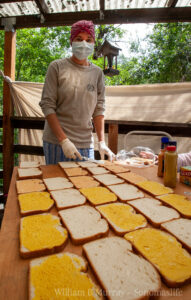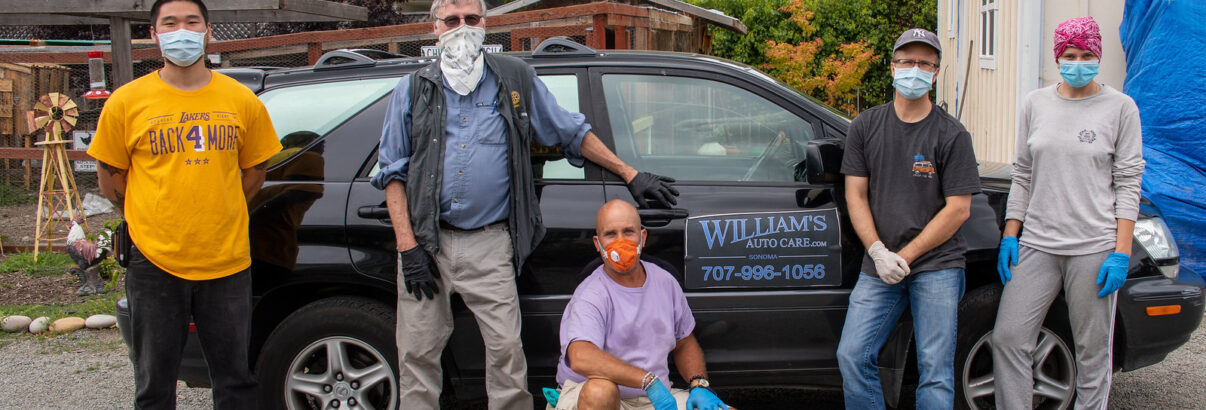Local network overcomes the “last mile” challenge to feed Sonoma County’s unsheltered residents.
story Lizi Urbanowicz
photos William Murray
Rows of sack lunches tower near a crate filled with apples and oranges.
Benji Horn is easy to spot in his turquoise t-shirt as he hovers over a dozen cardboard boxes. He distributes carrots, soup cans, and bags of pre-cooked lentils between each box, and then begins preparing turkey sandwiches.

Benji, a Sonoma local, started a biweekly food delivery for those in Sonoma County who have no shelter. He saw the need back in March, when the closure of churches and charities left homeless people with less resources than ever.
A true non-profit, his program does not have a board of directors, a Facebook page, or even an official name. Despite, or perhaps due to, the lack of infrastructure, Benji’s organizational skills shine. He constantly adapts his delivery route based on the changing locations of homeless encampments.
Benji’s focus is the “last mile” transportation hurdle: overcoming inaccessibility to food donation centers. People are hungry and food is available, but they need to be strategically connected. Benji seeks to fill this logistical gap, similar to the Food For All team who deliver food bank items to people unable to drive to the pickup locations.
An estimated 3,000 people in Sonoma County are homeless on any given night. On the most vulnerable rung of society, these individuals are high-risk for COVID-19. The closing of much-needed public restrooms, gym showers, and wifi hotspots has exacerbated suffering. Although temporary shelters seek to reduce the spread of the virus, many people still lack basic housing and food.
For those who are rent-challenged or living without the security of a stable income, organizations like the Redwood Empire Food Bank have stepped in to help. But for those without shelter, access is more difficult.
Our county has a lot of wealth,” says Benji, “so no one should have to go hungry.
Benji aspires to help as many people as possible while honoring law enforcement restrictions. He hopes to avoid escalating tension between un-housed people and businesses or neighborhoods. “The continuation of this program relies on not leaving a negative impact, like trash,” he says.
COVID-19 protocol includes packaging food in individual portions. The volunteers who assist Benji wear masks and gloves, and practice social distancing. Although a necessity, Benji admits it is unfortunate to wear barriers due to the psychological effect for a recipient who may already feel like an outcast. But he is quick to add that the overwhelming response has been gratitude, along with confirmation that people without shelter need support, now more than ever.
Delivering meals to Sonoma County’s unsheltered residents is made possible by donations from local grocery stores and food banks, as well as individuals in the community who lend vehicles, offer storage space, and purchase supplementary food and supplies. William’s Auto Care employees have participated for the past few months. According to owner William Murray, “We call this project ‘A Helping Hand.’ Caring for our neighbors has been one of our core values for the past 50 years, so we’re glad to help out.”
Dedicating several days a week to collect, package, and deliver food is only part of Benji’s mission. “Sharing loving kindness is as important as filling hungry bellies,” he says. To each person he encounters, Benji offers his full attention as a resource and advocate.
Being happy is one of the best ways we can serve others,” he says, as he finishes loading the truck for the day’s delivery route. He smiles and adds, “A friend once told me, ‘Money can’t buy happiness, but happiness can’t buy food.’ That’s true too.
Anyone interested in helping care for those without homes can contact helpinghandsonoma@gmail.com. Besides food, people are in need of socks, bandages, and electrolyte beverages. Masks and small bottles of hand sanitizer are also appreciated.

Lizi Urbanowiez is a UCLA graduate and an experienced freelance writer and editor. Born and raised in Northern California with family in Sonoma, she has brought her passion for food security and affordable housing to Los Angeles, New Mexico and Texas. In 2016 she joined the nonprofit Bike and Build on a 4,000-mile, 10-week, coast-to-coast bicycle odyssey from Portland, Maine to Santa Barbara, stopping to help build affordable housing projects along the way.

